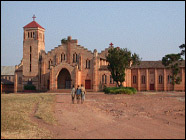 Religion Religion |
More than half of all Rwandans are Christians; most
are Catholics, but there are also several Protestant
denominations. About 5% of the population is Muslim.
The rest follow indigenous beliefs, which are still
very influential, and many Christians and Muslims
practise indigenous rituals in addition to their
own. In some cities, such as Kigali, the Baha'i
faith is becoming popular.
At the centre of Rwanda's traditional religion is
the god Imana, a powerful being who creates and
preserves life. He presides over lesser spirits,
who also affect people's daily lives. Within each
human being, animal and object is a special life
force, also called imana. When a human being dies,
this imana is transformed into one of the abazimu
(the spirits of the dead). When the abazimu are
troubled, they cause problems, such as sickness
or crop failure. To prevent such hardships, Rwandans
may consult an umufumu (witch doctor), who explains
why the abazimu are angry and what can be done to
pacify them. Over time, the abazimu of recently
dead people become sacred, honoured spirits, and
families pray to them. Ryangombe is the most powerful
ancestral spirit, honoured in special ceremonies.
The babandwa is a fraternity that is dedicated to
the worship of Ryangombe. In northern Rwanda, people
venerate Nyabingi, a female spirit similar to Ryangombe.
|
Some Rwandans believe
that small round stones from streams contain the
power of Imana and bring good luck. They collect
these stones and place them in a special hut called
a ndaro, just outside the family compound. Every
day, they bring offerings to the hut to please Imana.
When a family member dies, his or her body will
be buried close to the ndaro. Because people's spirits
live on after they die, funeral rituals are very
important. The family stops all work after the death,
and the women of the family shave their heads as
a sign of mourning.

Neighbours and friends do the chores during the
period of mourning. Death is believed to be "hot,"
so the umufumu may be summoned to "cool"
the house of the deceased person. The mourning period
may last for several months, during which time the
family may not eat meat or engage in life-giving
activities, such as planting crops. |

